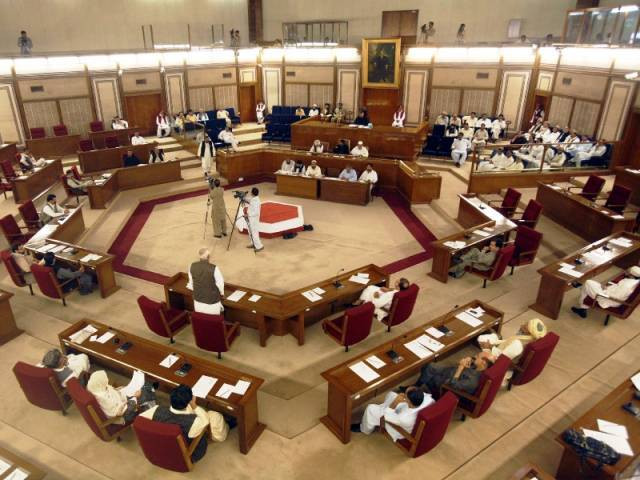Provincial Assembly passes Child Marriages Restraint Act 2025, introduces severe penalties for violators
Balochistan Assembly. PHOTO: EXPRESS
The Balochistan Assembly has passed the Balochistan Child Marriages Restraint Act, 2025, which imposes the strictest penalties on those involved in child marriages. Under the new law, a grown man who enters into a child marriage – and anyone who facilitates it – will face two to three years of rigorous imprisonment and a fine of between Rs 100,000 and Rs 200,000.
The law defines a child as any person under the age of 18 and declares all child marriages illegal – and in several circumstances void ab initio, meaning void from the beginning. The Act supersedes any conflicting laws in force throughout the province and takes effect immediately.
Strong penalties for offenders
- According to the law, any adult male who enters into a child marriage faces two to three years of rigorous imprisonment and a fine of Rs 100,000-200,000.
- Persons who perform, arrange, promote or promote a child marriage face the same penalty.
- Courts can add an additional three months in prison if fines are not paid.
- Nikah Khawans, Nikah Registrars and Union Council Secretaries are now legally required to verify the Computerized National Identity Cards (CNICs) of both parties before solemnizing a marriage. Failure to do so is an offense punishable with imprisonment of up to one year and a fine of up to Rs 100,000.
All offenses under the Act are cognizable, non-voluntary and non-bailable – meaning the police can act without warrants, bail cannot be granted easily and cases cannot be settled in private. Only a First Class Magistrate can try offences.
The law also declares child marriages void if the minor is kidnapped, sold, lured, forced or trafficked into marriage or immoral purposes. Children born from such marriages will be considered legitimate and their maintenance will be the responsibility of the father.
Repeal of the 1929 Act
The law formally repeals the colonial-era Child Marriage Restraint Act of 1929 in Balochistan, although ongoing cases under the old law will continue until they are concluded. Under the new legislation, the provincial government must draw up detailed regulations within six months.
The opposition calls the bill ‘un-Islamic’
Opposition lawmakers tore up copies of the bill when it was introduced, claiming the legislation violates Islamic law. Speaking to the media after its passage, Chief Minister Sarfraz Bugti said a majority of assembly members supported the bill, reflecting the strength of the democratic process.
He noted that the bill was reviewed by the relevant committee of the assembly over the past six months and was approved by the cabinet before being presented for a vote. “Difference of opinion is an inherent feature of democracy, but legislation is always passed in the best interest of the public,” Bugti said.
In Balochistan, child marriage is a long-standing problem and the main legislation has been completed in the Balochistan Assembly. It was not just a legal act, but it was the foundation of a healthy future.
— Sarfraz Bugti (@PakSarfrazbugti) 14 November 2025
He emphasized that the government prioritizes consensus-driven legislation, ensuring that all bills undergo extensive consultation and a transparent process. The Chief Minister reaffirmed his administration’s commitment to Balochistan’s development and the welfare of its citizens.
Opposition leader Younus Aziz Zehri criticized the legislation and reiterated that his party, the JUI-F, would not support any law it believes violates Islamic teachings. Following their protest, opposition lawmakers staged a walkout while chanting slogans against the newly passed bill.



